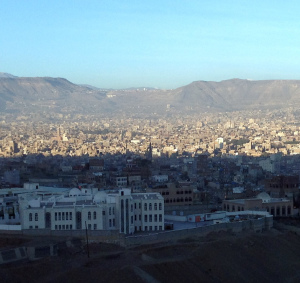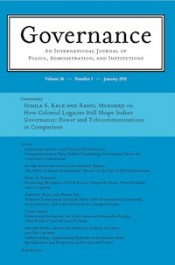A note from Yemen: Governance on the edge
Clay Wescott, Governance‘s Book Review Editor, was in Sana’a, the capital of Yemen, from January 17 to 24. The Yemeni government led by President Abdu Rabbu Mansour Hadi resigned on January 22. Here, Clay provides a short note about his visit.
I arrived in Sana’a, Yemen on Saturday, January 17th, to begin a week of support to the Ministry of the Civil Services and Insurance in the early implementation of human resources management and payroll reforms. The work was to include advice on developing a change management strategy, drawing on international experience, and incorporating this strategy into a work plan for 2015.
I had known that this work would be different from other assignments as I was required to spend six hours taking two online security courses, learning what to do in the case of kidnapping, a suicide bomber attack, and other cheerful possibilities. Still, I had worked in places such as Kabul, Dili, and Phnom Penh, and assumed I was ready.
My first foreboding came on the flight from Doha to Sana’a, when my seatmate said that all signs pointed to a coup taking place during the following week. He hoped it would be put off until we left, but one never knew in this part of the world.
On Sunday we had our first meeting with the Government’s Human Resources Working Group. The Group was focused on implementation of a 100 day plan. The aim was to register all civil servants in a biometric database, complete with ID numbers and fingerprints. This effort had been ongoing since 2005, and around 4/5 of the estimated 1.2 million civil servants and security forces had already been registered. What remained was to register the remaining staff, and to transfer all the files into a common database. This would allow, inter alia, identifying ghost workers and “double dippers”: staff registered more than once and receiving duplicate salaries and other benefits. My role was to outline some possible international support that could complement this effort, including design and implementation of basic human resources systems for recruitment, job descriptions, appraisal, and career development.
I was waiting in my hotel Monday morning for my ride to the office, when I received a call saying that the security situation was bad, and that we should not leave the hotel. We looked outside and saw explosions around the Presidential Palace. CNN was reporting from our hotel that there was a battle going on between Houthi forces, a Shiite group that had become the de facto power in Sana’a since last September, and the Presidential Guard.
Things calmed down Tuesday and Wednesday, although the situation remained tense. Our government team came to meet with us, and we continued work from our hotel. On Thursday, we were allowed to go to our office, and we had a debriefing with Government and development partners on our findings. On Thursday night, the President and his Cabinet resigned.
As I traveled in my armored car to the airport on Saturday, I wondered whether any of the proposals we had worked out with our Yemeni counterparts would move forward. Then things got tense. The first checkpoint was manned by 2 Houthi, one of whom was a young kid with an AK47 that seemed to be calling the shots. We were always careful to stop at these road blocks, and to treat the guards respectfully; a US Embassy car didn’t cooperate enough and got shot at earlier in the week. Driver Fawzi rolled down the window a notch to talk to the kid, and he insisted that he needed to search the car for guns. Fawzi said we were aid workers, and didn’t have any guns. He said that when he was driving foreigners he couldn’t open the door. The kid shouted a lot but didn’t raise his gun. Finally he waved us on.
Yemen needs an effective public service. Most of the heavy lifting needs to be done by Yemenis, but in some areas, they appreciate help from outside. Visiting such a fragile environment is always rolling the dice; but if there is ever to be peace, Yemenis and international partners will have to continue to find ways of working together.

